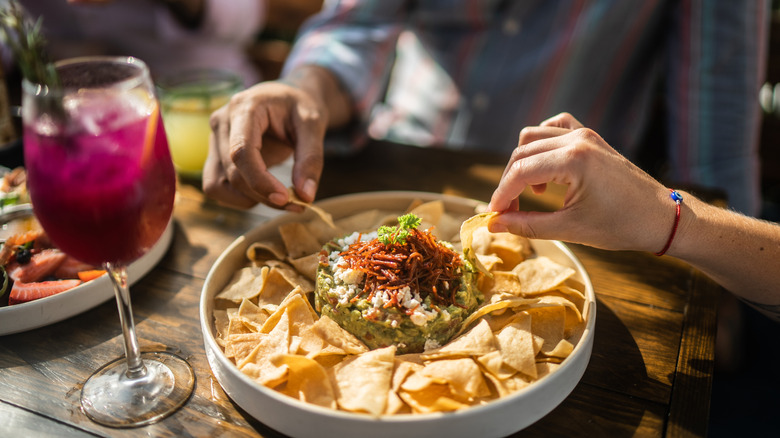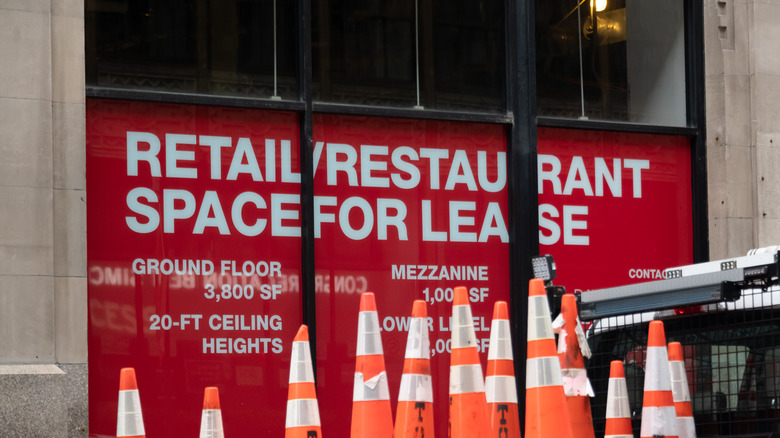A Southern Mexican Restaurant Chain Is Closing And Bankruptcy Has Nothing To Do With It
Texas-based restaurant chain, Fernando's, is officially closing both of its locations. Twenty years of "upscale Tex-Mex" business will meet its end when the chain's two North Texas locations, in Dallas and Richardson, close their doors on May 18, 2025. While plenty of restaurant chains are struggling and even facing bankruptcy due to financial issues these days, Fernando's is actually closing due to leasing issues. Fernando's Managing Partner, Anne Cowden, said in a farewell Instagram post that after "five months of lease negotiations at our Dallas location, we were unable to reach a lease agreement with the landlord. With the Richardson lease also expiring soon, this is the appropriate time to close both restaurants."
It is doubtful that Fernando's restaurant employees, or its patrons, would agree with Cowden's use of the word "appropriate." In fact, some restaurant-local Reddit users have already called out Cowden for deciding to close the restaurants, along with the restaurant's Dallas landlords for choosing to let a space go vacant short term in order to potentially cash in on high property values in the long-term. While such public commentary on the closure is based on emotion and speculation, it does shine a light on two dark corners of restaurant reality: restaurant closures due to owner exhaustion, and restaurant closures due to lease issues.
The impact of burnout on restaurants
Large restaurant chains commonly close due to high debt and low foot traffic (like once-popular breastaurant, Hooters), private equity inspiring bad business decisions (like seafood fan-favorite Red Lobster), and over-expansion creating more creditors than profits (see: Jack in the Box's recent decision to close locations). With that said, there might actually be some expectation from customers that outposts of these larger chains will inevitably close, either due to poorly-planned location choices or locally known quality control issues. However, the shuttering of a small restaurant chain like Fernando's can be surprising — and heartbreaking.
Small neighborhood chains can become generational mainstays, and the sudden closure of go-to may not compute for local customers who see a full restaurant every night and an empty storefront the next. Plus, vaguely stated closure announcements may not fully satisfy loyal customers who count on neighborhood favorites. However, no longer being able to (or wanting to) satisfy even the most loyal of customers can be reason enough to close a seemingly successful restaurant's doors.
It's never been easy to be in the restaurant business, and it certainly isn't in 2025. Everything from rising operational costs to tariff-induced price hikes to skyrocketing egg prices affect a restaurant's bottom line, and in turn, a restaurant owner's fatigue. This grind can burn out even the most seasoned restaurateur, and their employees. Hitting a limit due to age or exhaustion can be just as strong a contributing factor to a restaurant's closure as massive debt or low profits.
Lease issue tactics
While a particular restaurant may be the best in the world, or the neighborhood, it is nothing without a roof over its head. While real estate is big business on its own, often the interests of commercial landlords and real estate developers are at odds with restaurant space renters. Exorbitant commercial rents like those being charged in Dallas, paired with the recent economic downturn — and slowdown in discretionary spending — can spell doom for renters.
However, urban storefronts and restaurants can remain empty for months, years, and even decades as property owners wait for the "right" tenant of their space, or simply to cash in on an area's growing property value. While it might not make immediate sense for a commercial landlord to forego years of rent payments, even at potentially reduced rates — ultimately commercial landlords are not be as vulnerable as a single person or family owning a mom-and-pop restaurant or small restaurant chain.
Conglomerates of investors and real estate developers often own commercial properties, meaning there is less financial burden for them in the long run, even if the space sits empty. In fact, keeping a restaurant or storefront vacant can help a business group essentially call "dibs" on valuable space that they can cash in on when the time is right. This practice flirts with the age-old trick of purposely blighting an area to profit off of it during later development. Unfortunately, like with Fernando's closures, sour grapes over rent and vacancy can leave a bad taste in everyone's mouth.


